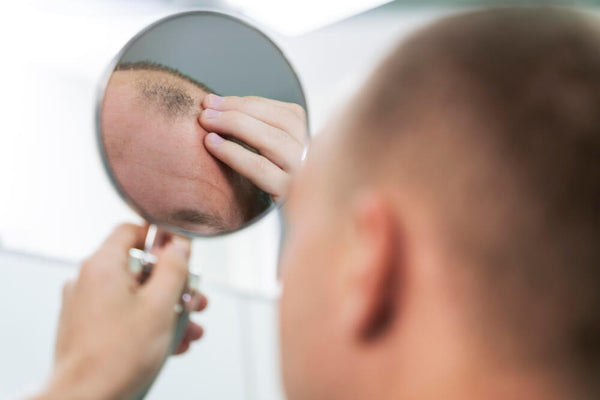Let me tell you about Michelle, a 42-year-old accountant who came to my Atlanta clinic thinking she just had "aging hair." For years, she'd watched her part slowly widen at the crown, using creative styling and fiber sprays to hide the thinning. She mentioned occasional itching but figured it was just dry scalp.
When I examined her under magnification, my heart sank. The telltale signs were there: early scarring, inflammation, and follicles that would never grow hair again. Michelle had CCCA, and she'd been living with it for years without knowing.
If you're noticing changes at your crown—even subtle ones—please keep reading. This might be the most important information about your hair you'll ever receive.
What CCCA Actually Does to Your Scalp
CCCA isn't like other hair loss where follicles just go dormant. This condition literally destroys them. Think of your hair follicles as tiny plants in soil. With regular hair loss, the plants might stop growing temporarily. With CCCA, the soil itself is turning to concrete.
The inflammation attacks the stem cells that regenerate hair, replacing them with scar tissue. Once that happens, no product, vitamin, or treatment can bring that follicle back. That's why early detection is everything.
The Signs Most Women Miss Until It's Too Late
CCCA is sneaky. Some women experience itching, burning, or tenderness. But many feel absolutely nothing while their follicles are being destroyed. That's what makes it so dangerous.
The progression is usually so gradual you might not notice until you've lost significant density. By then, the scarring is often extensive. I've seen women with beautiful, thick hair everywhere except that expanding circle at the crown where it's smooth and shiny—the hallmark of advanced scarring.
Why This Hits Our Community So Hard
CCCA disproportionately affects Black women, and while we don't know exactly why, the evidence is in our clinics every day. What we do know is that genetics play a role—if your mother, grandmother, or aunts experienced similar crown thinning, you're at higher risk.
The tragedy is that most women don't know CCCA exists until they've lost hair permanently. They blame their styling habits or aging, when they're actually dealing with a medical condition that requires specific treatment.
Our Approach: Stopping the Progression
At Nina Ross Hair Therapy, we've made early CCCA detection a priority because we've seen what happens when it's caught too late.
We start with trichoscopy—examining your scalp under high magnification to spot the early signs of inflammation and scarring long before they're visible to the naked eye.
If we catch CCCA early, we use powerful anti-inflammatory treatments to calm the immune response and protect your remaining follicles. For early cases, we've had great success with exosome therapy to help regulate the inflammatory process and support follicle health.
But here's the hard truth: we can't reverse existing scarring. We can only protect what hasn't been destroyed yet. That's why timing is everything.
What You Can Do Right Now
If you're noticing any crown thinning—no matter how slight—please don't write it off as "just getting older" or "stress." Come see us for a proper evaluation. The few minutes it takes could save your hair.
Pay attention to any itching, tenderness, or unusual sensations at your crown. These might be your only warnings before permanent damage occurs.
If CCCA runs in your family, be proactive about scalp checkups. Genetics load the gun, but early detection prevents it from firing.
Your Crown Doesn't Have to Be a Casualty
I've watched too many women discover CCCA only after they've lost hair they can never regain. But I've also celebrated with women who caught it early and preserved their hair through consistent treatment.
Michelle, the accountant I mentioned earlier? We caught her CCCA in time to save about 70% of her crown hair. She'll need ongoing treatment, but she won't have to watch that circle keep expanding.
Ready to Protect Your Crown?
If you're noticing changes at your part or crown, don't wait and wonder. Book your Hair Therapy Evaluation with us today for just $99. Let's make sure what you're experiencing is just normal thinning and not something that could permanently damage your hairline.
![Central Centrifugal Cicatricial Alopecia [CCCA]: The Silent Hair Loss Destroying Black Women's Crowns](http://ninaross.co/cdn/shop/articles/426eec74-7f6f-4b4e-9114-4e4a07324514-zaeh_bustle_apr2016-522_800x800.jpg?v=1761680355)













